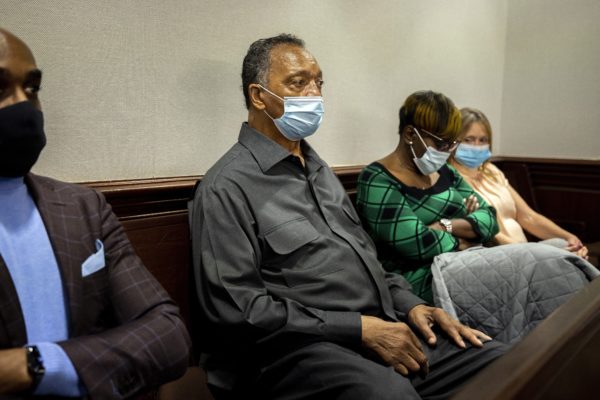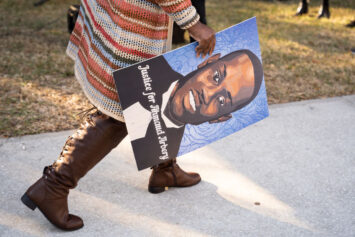The south Georgia judge presiding over the trial of the men accused of murder in the February 2020 killing of Ahmaud Arbery has dismissed a defense request for a mistrial. Lawyers that are representing the accused in the case said the presence in the courtroom of Black ministers and displays of emotion by Arbery’s mother are biasing the jury, making it impossible for their clients to get a fair trial.

Superior Court Judge Timothy Walmsley disagreed.
After seeing civil rights leader Rev. Jesse Jackson take a seat in the courtroom on Monday, Nov. 15, defense attorney Kevin Gough, who is representing defendant William “Roddie” Bryan, asked the judge to order Jackson to leave.
Gough’s request continued a tactic he first adopted last week, when he reacted to the presence of Rev. Al Sharpton in the courtroom on Nov. 10 by telling Judge Walmsley the following day, “We don’t want any more Black pastors coming in here. There is no reason for these prominent icons in the civil rights movement to be here.
“With all due respect, I would suggest, whether intended or not, that inevitably a juror is going to be influenced by their presence in the courtroom,” he continued.
“If a bunch of folks came in here dressed like Colonel Sanders with white masks sitting in the back, that would be —” he continued before being cut off by the judge.
Although Gough, whose request was denied by Walmsley last Thursday, apologized for his remarks before court proceedings began on Friday, Nov. 12, by Monday he was renewing his initiative of objecting to the presence of Black ministers in the courtroom, but on this day defense attorneys also found the presence of Arbery’s mother problematic.
When Wanda Cooper-Jones, seated next to Jackson, began weeping in the courtroom on Monday as a photo of her son was shown, the defense claimed that jurors were becoming sympathetic to the victim.
Reporters on the scene say this prompted Gough to make a motion that her crying in the courtroom was grounds for a mistrial. Attorneys for both Gregory and Travis McMichael joined the mistrial motion. Robert Rubin, an attorney for Travis McMichael, said Monday, “These types of moments … favor the state.”
Walmsley denied the mistrial request, noting that the courtrooms are open to the public and that anyone may enter if they so desire.
“The court is not going to single out any particular individual or group of individuals as not being allowed into his courtroom as a member of the public,” Walmsley said Monday.
In his remarks, he referenced several comments that Gough made last week regarding “Black pastors” and their juxtaposition to Kentucky Fried Chicken founder Colonel Sanders, calling those swipes “reprehensible.”
The Atlanta Journal-Constitution recorded Judge Walmsley as stating sternly that the defense’s remarks are amplifying the highly racially charged atmosphere of the trial — not the tears of a bereaved mother or the presence of a Black religious leader.
“I will say that [the attention] is directly in response, Mr. Gough, to statements you made, which I find reprehensible,” he shared. “The Colonel Sanders statement you made last week, I would suggest may be something that has influenced what is going on here.”
The judge added, “If there is a disruption, you’re welcome to call that to my attention.”
Walmsley has worked to maintain a reasonable semblance of equity and fairness in this case. At the top of the case, as reported by Reuters, he publicly noted that the jury was predominately white — a design constructed by the defense. He shared that there seemed to be “intentional discrimination’ in selecting the jury.
This high-profile prosecution seeks to gain justice for the slain Black man Ahmaud Arbery, who was killed on Feb. 23, 2020, after being chased by three white men, Greg McMichael, his son Travis McMichael and their neighbor William “Roddie” Bryan, in a community near Brunswick in Glynn County, Georgia. They argued they were making a legitimate “citizen’s arrest.
The 25-year-old man was shot dead by Travis McMichael. The cellphone video of the fatal shooting — shot by Bryan — was made public in May that year, amidst a series of civic unrest prompted by police-involved violence and race-based killings.
With this as the backdrop, the defense remains concerned about Jesse Jackson, a notable advocate for racial equality. The civil rights leader said, after protesting with the family, witnessing the selection of a racially-lopsided jury, sitting in the courtroom and hearing the concerns of the defense, and thinking about the life of Arbery, “He is bigger than he ever was in life. He is all over the world now.”
Jackson also said, “It is my right to be there. The judge said it is my constitutional right to be there. It is my moral obligation to be there.”
“I’m about people who are in need and have their backs against the wall,” he continued. “It’s what we do.”
